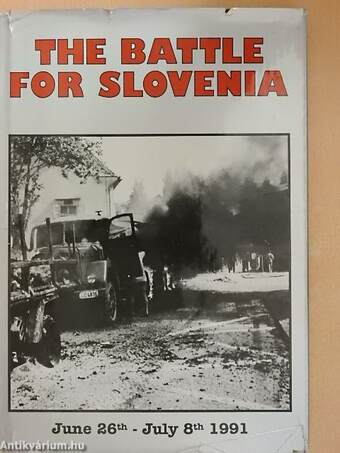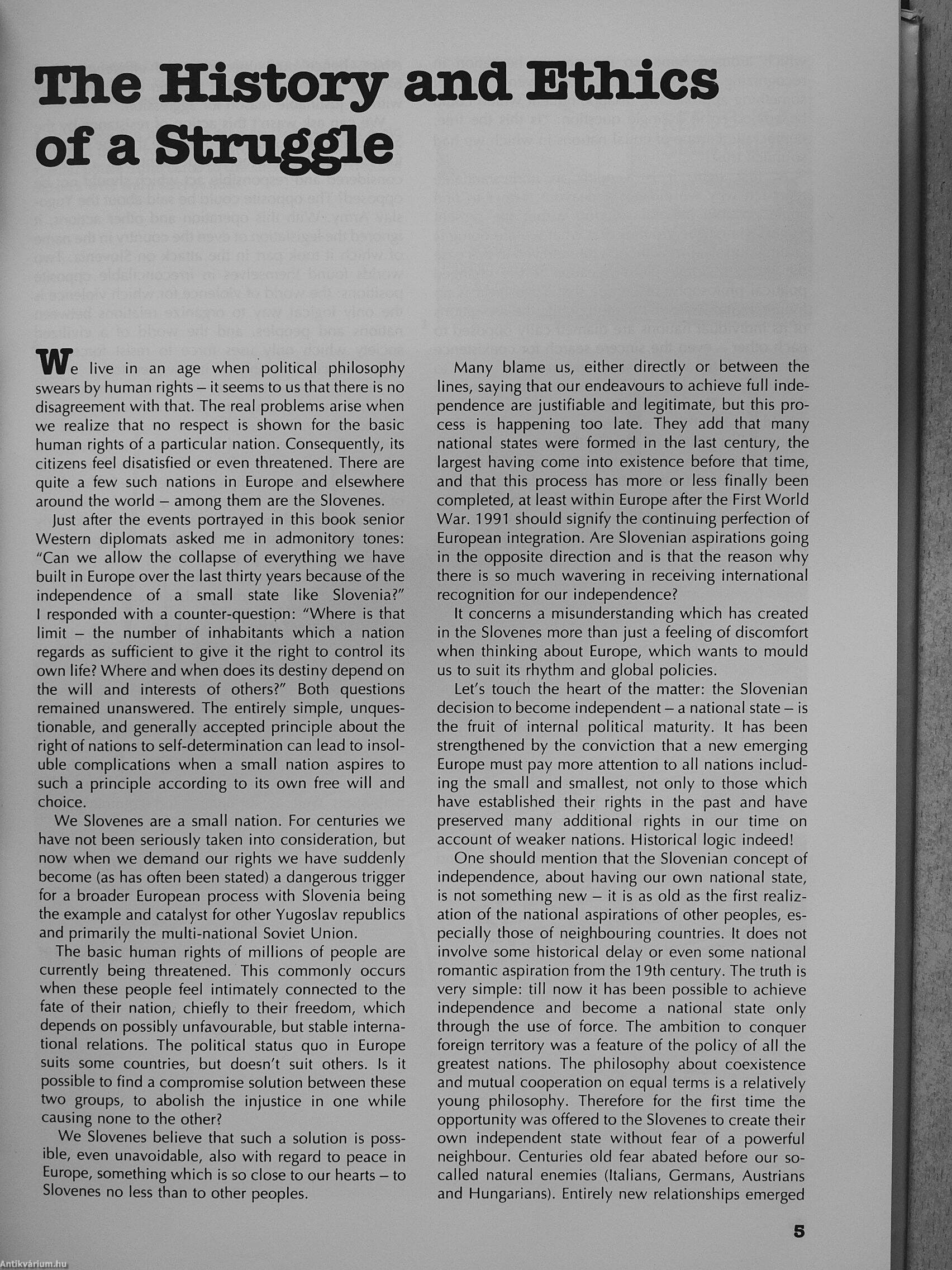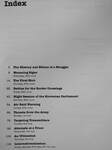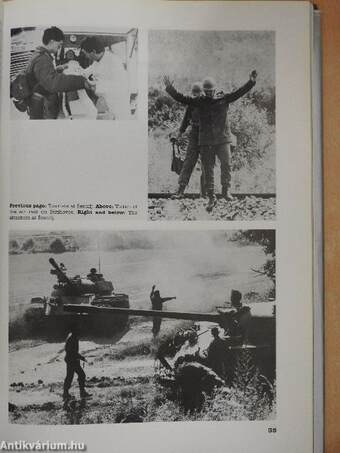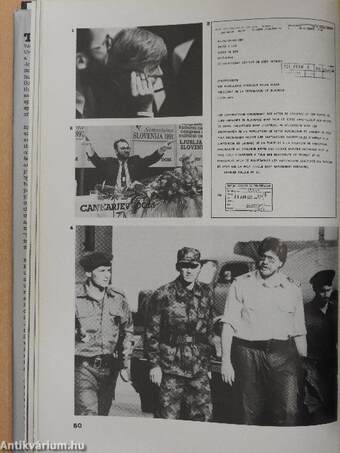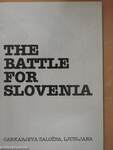1.076.523
kiadvánnyal nyújtjuk Magyarország legnagyobb antikvár könyv-kínálatát

VISSZA
A TETEJÉRE
JAVASLATOKÉszre-
vételek
The Battle for Slovenia
June 26th - July 8th 1991
| Kiadó: | Cankarjeva Zalozba |
|---|---|
| Kiadás helye: | Ljubljana |
| Kiadás éve: | |
| Kötés típusa: | Fűzött keménykötés |
| Oldalszám: | 130 oldal |
| Sorozatcím: | |
| Kötetszám: | |
| Nyelv: | Angol |
| Méret: | 30 cm x 21 cm |
| ISBN: | 86-361-0760-1 |
| Megjegyzés: | További kapcsolódó személyek a könyvben. Fekete-fehér fotókkal illusztrált. |
naponta értesítjük a beérkező friss
kiadványokról
naponta értesítjük a beérkező friss
kiadványokról
Előszó
TovábbFülszöveg
A Ills was a war that took place virtually in the heart of Europe, before the eyes of the civilised world. For a fateful few days a smaU, peace--lovlng Alpine nation of barely twc mlUlon people was fighting for the high Ideals Inspired by the European Conunumty and the rest of the world: the right to self-determination, the establishment of true democracy, respect for human rights, freedom of speech, and a European standard of Uving.
In the Interests of retaining stability In the world we all heard strong arguments from Belgrade about avoiding any "Lebanonization" and that true democracy In the Balkans could only be achieved by holding the federation of sbc diverse republics and two autonomous (now annexed) provinces together at any cost - even by the use of force. Unfortunately, we have aU witnessed the horrors of this poUcy. Foreign politicians and diplomats with a shallow understanding of the situation (unlike those in the neighbouring countries bordering Slovenia) encouraged... Tovább
Fülszöveg
A Ills was a war that took place virtually in the heart of Europe, before the eyes of the civilised world. For a fateful few days a smaU, peace--lovlng Alpine nation of barely twc mlUlon people was fighting for the high Ideals Inspired by the European Conunumty and the rest of the world: the right to self-determination, the establishment of true democracy, respect for human rights, freedom of speech, and a European standard of Uving.
In the Interests of retaining stability In the world we all heard strong arguments from Belgrade about avoiding any "Lebanonization" and that true democracy In the Balkans could only be achieved by holding the federation of sbc diverse republics and two autonomous (now annexed) provinces together at any cost - even by the use of force. Unfortunately, we have aU witnessed the horrors of this poUcy. Foreign politicians and diplomats with a shallow understanding of the situation (unlike those in the neighbouring countries bordering Slovenia) encouraged military aggression by the communist regime in their desire to preserve the oUched "territorial integrity of Yugoslavia" in the vam hope of preserving stability in the region.
Western poUticians and diplomats have yet to grasp the fact that wlthm Europe, even in this day and age, there are stUl certain political leaders and generals who do not respond to their pleas for compromise, tolerance, moderation and negotiation, and are only too willing to use ruthless armed force against those who dispute their pohcies. This conflict is not actually about preserving the unity of Yugoslavia - it is about retaining power and wealth for Serbia, the largest Yugoslav republic, while serving the political and ml-Utary ambitions of its hard-Une communist leaders on the pretext of holding the federation of Yugoslavia together.
Slovenia (and Croatia) did not decide to leave the former Yugoslav federation overnight. Negotiations among all republics have been continuing for many years, but they were always obstructed by Serbia, which saw its source of revenue for the Serbian-led Federal army and its own power base threatened. This frustration could no longer be endured by
Uie peoples of other repul)hos - witness the suppression of the Albanian majority in the provtnoe of Kosovo. Why is it that in Slovenia and Croatia huge majorities supported the drive towards fiiU independence?
So it was that after a marriage lasting almost seventy-three years the two most Western-leaning repubUcs, namely Slovenia and Croatia, sought gradual moves towards independence after a long period of hefly negotiation, and embarked on a poUoy of transforming their economies and societies to meet European standards. However, the moves by these two republics, based on the right to self-determination, obviously did not find favour with those who sought to retain their power - whatever the cost. Unfortunately, Europe and the rest of the world did not respond with open arms, either. Fearful of the changes taking place, many Western statesmen, pohticians and diplomats refused to apply the same criteria and values that they practice in their own countries to the newly emerging states. Some feared that this would set a precedent for smaller communities and peoples around the world who are seeking autonomy and independence from other states, with the dismantling of the Soviet Empire in mind. One day It will be seen that it Is safer for the world community for peoples to establish new relations among themselves as separate states if they so desire, not as frustrated, suppressed and exploited minorities within larger mega-states held together by force.
If this is the case, the civilised, developed countries of Europe and the rest of the world now have a dUemma on their hands: how to reconcile their proclamations about democracy, self-determination, respect for human rights and freedom of speech for themselves while virtually rejecting the aspirations of other peoples striving to attain these very same goals.
Preserving the status quo can provide an musion of stabUlty for a limited period. Such situations can be ditftised by responding to, accepting, and even promoting changes in a positive way instead of preserving the status quo.
States link — and separate. Divorce is never easy, but can be made as painless as possible by open hearts and minds acting together for the common good. Vissza
Témakörök
- Idegennyelv > Idegennyelvű könyvek > Angol > Történelem > Európa története > Egyéb
- Történelem > Kézikönyvek > Kronológiák
- Történelem > Idegennyelvű > Angol
- Történelem > Politika > Külpolitika > Egyéb
- Történelem > Politika > Belpolitika > Egyéb
- Történelem > Legújabb kor > A hidegháború kora (1946-1991)
- Történelem > Legújabb kor > Globalizálódó világ
- Történelem > Hadtörténet > Háborúk, csaták
- Történelem > Hadtörténet > Hadügy, hadviselés
- Történelem > Kontinensek szerint > Európa, európai országok története > Közép-Európa > Egyéb



